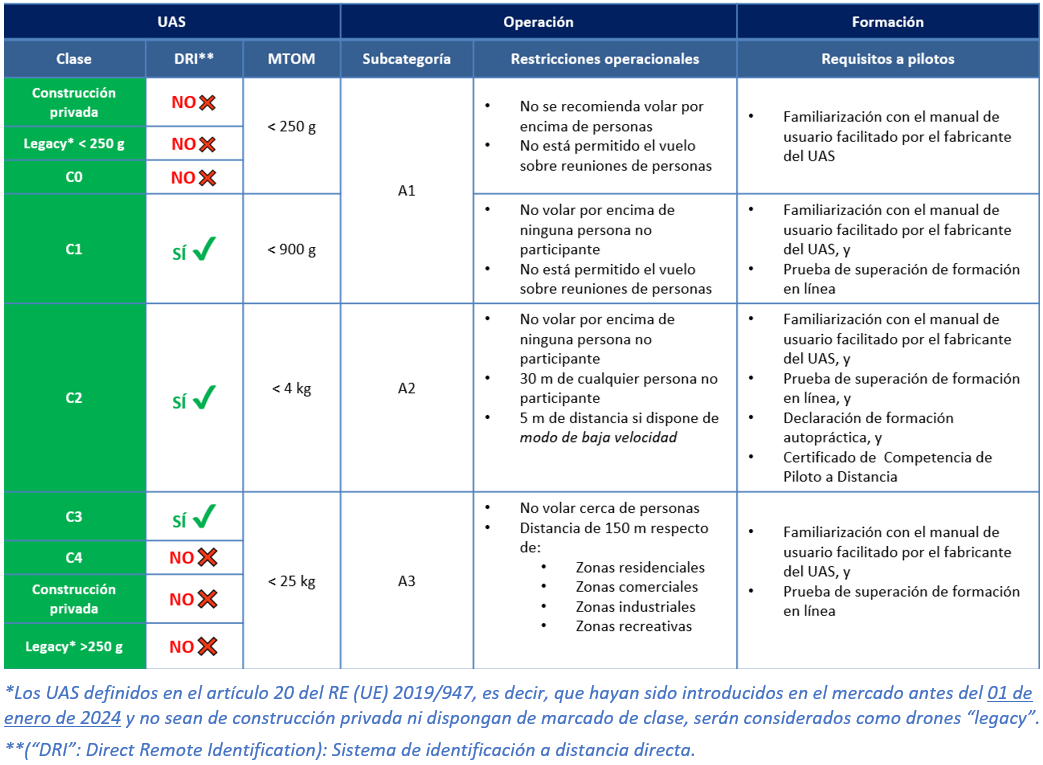UAS/dron remote pilot training
Transition period for RPAS/UAS remote pilots
Who is it addressed to?
- Basic or advanced certificate issued in accordance with Royal Decree 1036/2017;
- Any pilot licence (PPL, CPL, ATPL), including the ultralight pilot licence (ULM), issued in accordance with current regulations and not dispossessed of it under penalty proceedings;
- Certificate of having passed the examinations of all the theoretical knowledge required to obtain a pilot licence within the framework of the European Union Aviation Safety Agency (EASA), issued by an Approved Training Organisation (‘ATO’) by AESA, EASA or the competent authority of a Member State, or, in the case of the Spanish ultralight licence, an individual APTITUD certificate issued by AESA after the relevant official theoretical knowledge examination; O
- A pilot-manned military aviation license in the service of the Spanish Armed Forces and the Guardia Civil.
This section is intended for RPAS pilots who have practical certificates issued in accordance with Law 18/2014 or Royal Decree 1036/2017, or theoretical certificates issued in accordance with Law 18/2014, or means of justification of theoretical knowledge in accordance with Article 34 of Royal Decree 1036/2017, these being:
Transitional period
- Validity during the transitional period of remote pilot certificates according to national regulations (RD1036/2017 and Law 18/2014)
Article 22 and Article 23 of Implementing Regulation (EU) 2019/947 provide for a transitional period in which Member States may determine equivalent required training to carry out operations in ‘open’ or ‘specific’ category under a national standard scenario (‘STS-ES’). In the case of Spain, as a Member State, and EASA, as a competent authority, has defined the equivalent training of RPAS/UAS remote pilots during this transitional period. The requirements set out in this information note are set out in detail:
Therefore, remote pilots who are trained in accordance with national regulations and have not yet obtained the certificates in accordance with Implementing Regulation (EU) 2019/947 may continue to operate in ‘specific’ category under a national standard scenario (‘STS-ES’) under a set of conditions laid down for each case.
Regardless of the training in this transitional period, registration as an operator with the new procedure, opened since 31 December 2020 with the application of Commission Implementing Regulation (EU) 2019/947, is necessary, provided that the conditions detailed in the drone/UAS operator register are fulfilled.
Also, to recall that, in order to perform professional operations with UAS in controlled airspace, both in open category and in specific category, in accordance with Article 33 of Royal Decree 1036/2017, the remote pilot must be in possession of the qualification of radio speaker, as well as proof of adequate knowledge of the language or languages used in communications.
‘Open’ category
From 1 January 2024 it will be essential to comply with the training criteria set out in the following table:

‘Specific’ category under national standard scenarios (STS-ES)
- Theoretical training:
- Practical training:
Until 31 December 2025, remote pilots who meet the training requirements set out in points UAS.STS-ES-01.020 and UAS.STS-ES-02.020 of the Director’s Resolution approving the national standard scenarios STS-ES-01 and STS-ES-02 may operate under national standard scenarios (statements to STS-ES-01 and STS-ES-02 submitted until 30 August 2024). These requirements are:
a. Basic or advanced certificate obtained in accordance with Article 50.5(c) of Law 18/2014;
b. The basic or advanced certificate of theoretical knowledge obtained in accordance with Article 34(1)(b) of Royal Decree 1036/2017;
c. A remote pilot theoretical knowledge certificate in accordance with Appendix A to Chapter I of Appendix I to the Annex to Commission Implementing Regulation (EU) 2019/947 for the conduct of operations under standard scenarios;
d. Any pilot licence, including the ultralight pilot licence, issued in accordance with the regulations in force and not dispossessed of it under penalty proceedings;
e. A certificate of having passed the examinations of all the theoretical knowledge required to obtain a pilot licence under EASA, issued by an ATO recognised by AESA, EASA or the competent authority of a Member State, or, in the case of the Spanish ultralight licence, an individual APTITUD certificate issued by AESA after the relevant official examination of theoretical knowledge;
F. A pilot-manned military aviation licence in the service of the Spanish Armed Forces and the Guardia Civil; or
g. A certificate of remote pilot theoretical knowledge, in accordance with Appendix A to the Director’s Resolution approving the national standard scenarios STS-ES-01 and STS-ES-02, to carry out operations in national standard scenarios in Spain, issued by EASA.
a. An accreditation document in accordance with Article 50.5(e) of Law 18/2014;
b. A certificate of practical training in accordance with Article 33(1)(d) of Royal Decree 1036/2017;
c. A full practical skills training accreditation for STS in accordance with Appendix I, Chapter I, Appendix A to the Annex to Commission Implementing Regulation (EU) 2019/947, issued by a recognised entity or UAS operator declared to provide practical training; or
d. A full practical skills training accreditation for STS-ES, in accordance with Appendix A to the Director’s Resolution approving the national standard scenarios STS-ES-01 and STS-ES-02, issued by an entity recognised by EASA or UAS operator declared to provide practical training.
Contact AESA UAS Division:
In case of doubt or special situations related to the training of remote pilots in a transitional period, you can direct your inquiry to the training mailbox (formaciondrones.aesa@seguridadaerea.es)


